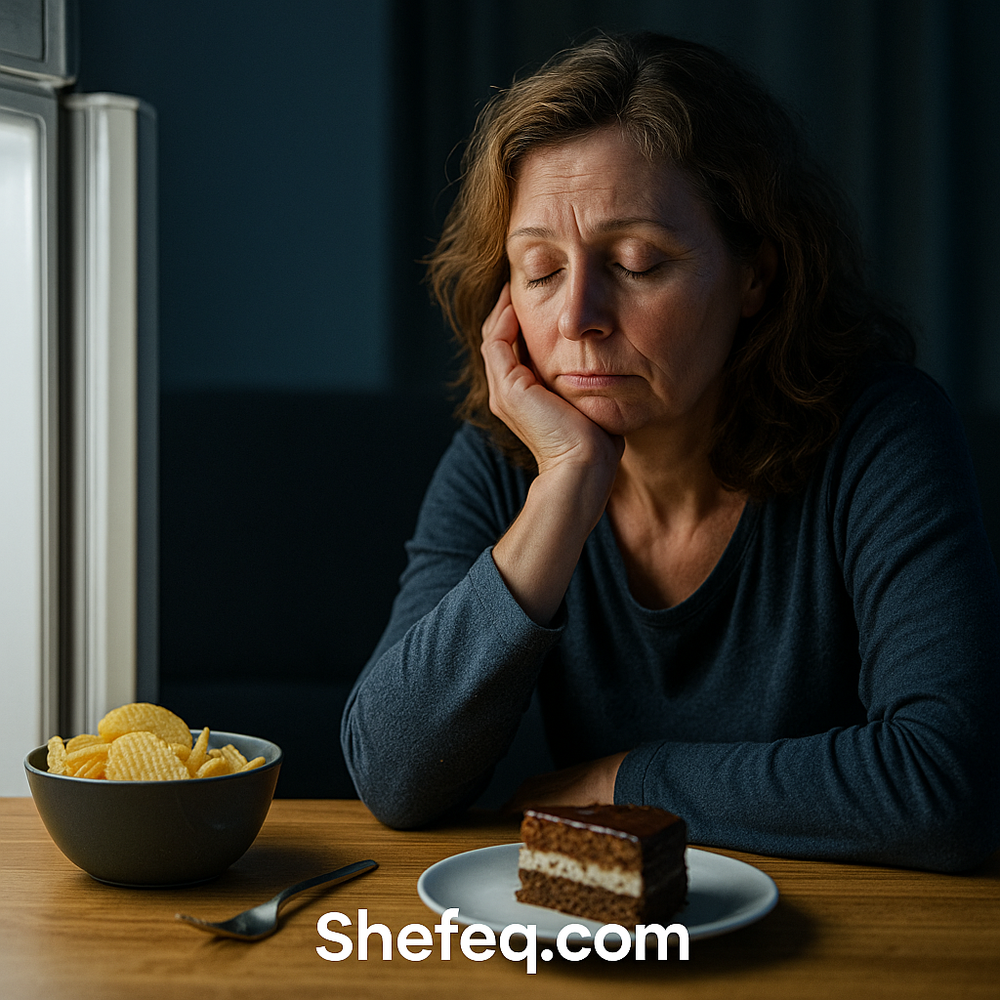I. INTRODUCTION: Silent Aging at the Night Table Our body is like a clock. Every cell, every hormone, every system works in rhythm. The night is the most delicate and profound silence of this rhythm. But when that silence is broken by an opening fridge, a forkful of food, and a slice of cake — the body doesn't just digest the intrusion. It ages.
In this article, we will explore how nighttime eating affects the body, how it accelerates aging on a cellular level, from hormonal imbalances to sleep mechanisms, and examine its aesthetic and psychological consequences from both scientific and artistic perspectives.
II. WHAT IS NIGHTTIME EATING? — TIMING MATTERS Nighttime eating is not just about eating late hours; it's eating in opposition to the body's biological rhythm. Typically, eating after 9:00 PM — especially sugary, fatty, and carbohydrate-rich foods — is considered nighttime eating.
Every bite at night halts the body's repair process and redirects it toward energy expenditure. This means not restoration, but exhaustion.
III. NIGHT EATING AND CELLULAR AGING
-
Blocking Autophagy At night, the body uses autophagy to clean out damaged or dead cells. Eating at night interrupts this process, leaving cellular waste to accumulate. Result: Skin ages faster, organs suffer damage, cancer risk increases.
-
Mitochondrial Fatigue When food enters the system at night, mitochondria are forced to keep working instead of regenerating. This leads to a loss of function — resulting in low energy and cell death.
IV. SLEEP AND HORMONES: FOOD DISRUPTS MELATONIN
-
Reduced Melatonin Speeds Aging Melatonin is not only a sleep hormone but also an antioxidant and anti-aging protector. Nighttime eating decreases its production → weaker antioxidant defense → increased cell damage.
-
Disrupted Leptin and Ghrelin Balance Leptin (satiety hormone) and ghrelin (hunger hormone) should stay balanced at night. Night eating disrupts this balance → overeating cycle begins → accelerated metabolic aging.
V. IMPACT ON SKIN — WHEN BEAUTY'S CALM IS DISTURBED
-
Decreased Collagen Collagen production occurs during the nighttime repair phase. Nighttime eating halts this process → reduced skin elasticity, appearance of wrinkles.
-
Puffy Eyes, Dull Skin Sugar and salt consumed at night lead to puffiness, dullness, and dark under-eye circles. One piece of chocolate at night — and your face may look a year older in the morning.
VI. LIVER AND METABOLIC AGING
-
Slowed Nighttime Liver Function At night, the liver enters detox mode. Night eating disrupts this routine → toxin buildup, obesity, and inflammation rise.
-
Insulin Resistance and Early Diabetes Night eating keeps blood sugar levels high. This creates insulin resistance → organs wear out prematurely.
VII. BRAIN, MEMORY, AND LATE-NIGHT MEALS
-
Disruption of REM Sleep REM sleep is essential for brain cell repair and memory consolidation. Night eating disturbs this cycle → forgetfulness, brain fog, early cognitive decline.
-
Increased Alzheimer's Risk Studies show that nighttime eaters have a 2-3 times higher risk of Alzheimer's and Parkinson's. Brain cells need silence, not food, to recover.
VIII. MIND AND EMOTIONS: HOW EMOTIONAL HUNGER EXHAUSTS THE BODY Night eating is often a result of emotional hunger, not physical need. This habit leads to psychological aging, reduced self-control, self-blame, and loneliness. Each late-night snack = more guilt in the morning, less motivation, and a more worn-out soul.
IX. STOPPING NIGHTTIME EATING — BE RESPONSIBLE FOR YOUR BODY What to do? — Finish your last meal by 7:00–8:00 PM. — Drink water, but don’t eat. — If hungry: try warm herbal tea, 1 date, or a handful of almonds. — Turn off your phone early — let melatonin rise. — Seek inner peace not in food, but in breathing, prayer, writing, or music.
X. CONCLUSION: DON’T EAT AT NIGHT — GIVE YOUR BODY SILENCE Nighttime eating is a script not only for physical but also for spiritual aging. It's not fullness — it's a surrender of beauty, energy, and mental clarity. Fasting at night — sometimes it’s the path to youth. One who loves their body feeds the night with silence, not food.
QUESTION TO THE READER Do you let your body sleep, or do you force it to work hungry and exhausted? Isn’t sometimes not eating the true protection?

